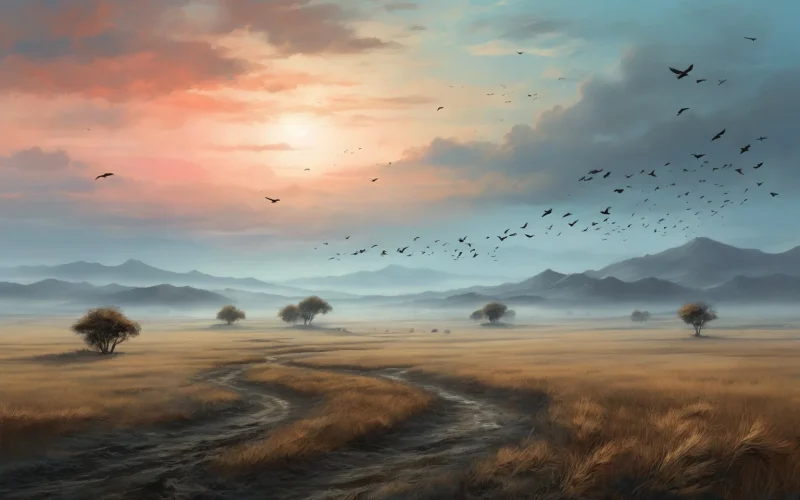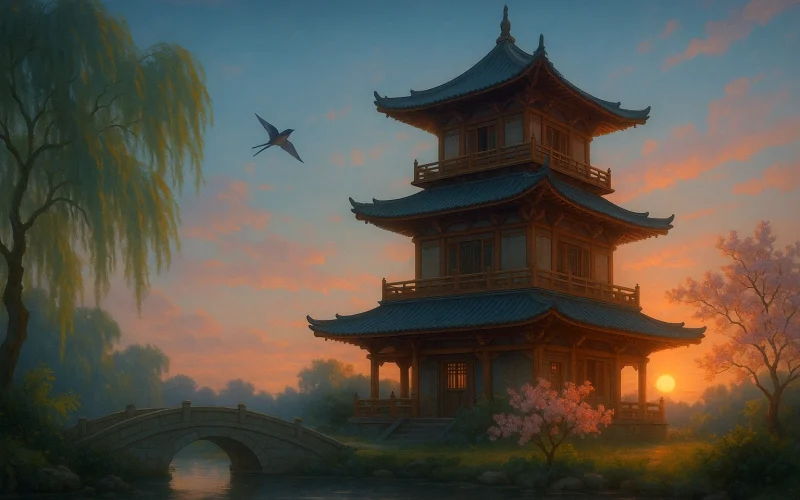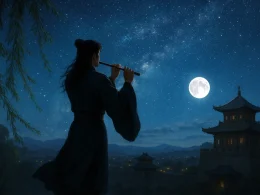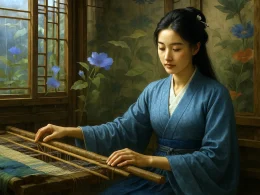Woods perch, wilds drink—scattering crows,
Wind-blown haze blurs the setting sun.
Short wheat thirsts for rain's return,
Distant peaks whisper to clouds.
Lost at crossroads, I seek wheel-tracks,
Saved by tall trees waving wine banners.
Each elder I meet at the ford
Pauses not his hoe's steady swing.
Original Poem
「楚村道中 · 其一」
周邦彦
林栖野吸散鸦群,极目风霾乱日曛。
短麦良良乾忆雨,远峰黯黯细输云。
愁逢杂路寻车辙,赖有高林出酒巾。
辄得问津凡父老,不应看客废锄耘。
Interpretation
Composed during Zhou Bangyan's later years amid political turmoil and frequent travels, this poem reflects his contemplative and introspective style after transitioning from ci to poetry. Set in the rustic landscapes of Chu village (modern Hubei), the work intertwines natural observation with personal hardship, mirroring the social instability of the Southern Song dynasty. Through vivid depictions of crows, wheat fields, and misty mountains, Zhou projects his inner turmoil onto the countryside, creating a poignant blend of external scenery and internal reflection that characterizes his mature poetic voice.
First Couplet: "林栖野吸散鸦群,极目风霾乱日曛。"
Lín qī yě xī sàn yā qún, jí mù fēng mái luàn rì xūn.
Woods and fields exhale, scattering crows—
as far eyes strain through windblown haze
that smothers the dying sun.
The opening juxtaposes ecological respiration ("woods and fields exhale") with sudden avian disruption, where "scattering crows" (散鸦群) symbolize both literal disturbance and the poet's fragmented psyche. The "windblown haze" (风霾乱日曛) operates as meteorological and political metaphor—a suffocating atmosphere that obscures clarity, with the "dying sun" (日曛) marking temporal and perhaps dynastic decline.
Second Couplet: "短麦良良乾忆雨,远峰黯黯细输云。"
Duǎn mài liáng liáng gān yì yǔ, yuǎn fēng àn àn xì shū yún.
Stunted wheat yearns parched for rain,
distant peaks exhale
threads of cloud in gloom.
Personification reigns here—the "stunted wheat" (短麦) anthropomorphized as "yearning" (忆雨) embodies peasant struggles during drought, while "peaks exhaling clouds" (细输云) suggests nature's labored breathing. The couplet's parallel structure (crops below, mountains above) creates a vertical axis of suffering, with the delicate "threads of cloud" (细输云) mirroring the tenuous hopes of both land and poet.
Third Couplet: "愁逢杂路寻车辙,赖有高林出酒巾。"
Chóu féng zá lù xún chē zhé, lài yǒu gāo lín chū jiǔ jīn.
Lost where forked paths confuse wheel ruts,
I bless tall woods
that offer cloth-spread wine.
The spatial dilemma of "forked paths" (杂路) transcends geography, becoming existential indecision. The "sought wheel ruts" (寻车辙) symbolize Zhou's search for political and artistic direction in turbulent times. Contrastingly, the "tall woods" (高林) emerge as sanctuary, their "cloth-spread wine" (酒巾) ritualizing temporary respite—a moment where nature's canopy becomes both shelter and tavern.
Fourth Couplet: "辄得问津凡父老,不应看客废锄耘。"
Zhé dé wèn jīn fán fù lǎo, bù yīng kàn kè fèi chú yún.
At every ford I query elders,
who chide: "No traveler should watch
others till unplowed fields."
The concluding couplet crystallizes Zhou's agrarian philosophy. The "queried elders" (问津凡父老) represent accumulated wisdom of the land, their rebuke transforming agricultural advice into universal ethos: the moral imperative to cultivate one's own "fields" (耘)—be they literal or metaphorical. This admonition against passive observation ("no traveler should watch") underscores Zhou's late-life conviction in active, purposeful labor despite chaos.
Holistic Appreciation
Zhou constructs a quadriptych of rural allegory: avian disarray (first couplet), thirsty crops and sighing mountains (second), path-finding dilemmas (third), and ultimately agrarian wisdom (fourth). This progression mirrors his psychological journey—from disorientation through suffering to temporary solace and finally hard-won resolution.
The poem's structural genius lies in its vertical and horizontal dimensions: the vertical axis (stunted wheat below, cloud-sighing peaks above) emphasizes nature's stratified suffering, while the horizontal (forked paths, river fords) maps human wandering. Resolution comes only when these axes intersect in the final couplet's earthy wisdom—a meeting of heaven's challenges (drought, haze) and earth's laborers (elders, plowmen).
Artistic Merits
- Avian symbolism
The "scattering crows" (散鸦群) serve as avian correlatives for the poet's dispersed thoughts amid turmoil. - Meteorological pathos
"Windblown haze" (风霾) and "threads of cloud" (细输云) externalize political and emotional obscurity. - Agricultural metaphor
The unplowed fields (废锄耘) become a powerful symbol for neglected duties or squandered potential. - Confucian ethos
The elders' admonition embodies the Confucian ideal of societal contribution over passive observation.
Insights
Zhou's poem articulates a philosophy of persevering cultivation—both literal and metaphorical—amid adversity. The "stunted wheat" yearning for rain mirrors human longing for spiritual or political nourishment, while the "unplowed fields" warn against intellectual and moral inertia.
For contemporary readers, the work resonates as an antidote to modern alienation. Its imperative—to "plow one's own field" rather than spectate—speaks directly to an age of passive consumption, reminding us that meaning arises from active engagement with life's rocky soil.
Ultimately, the poem suggests that orientation comes not from path-finding alone, but from the wisdom of those who've tilled the land before us. Zhou's "elders at the ford" (问津凡父老) offer a timeless lesson: in confusing times, we must both seek guidance and keep plowing, lest our fields—and souls—lie fallow.
About the Poet
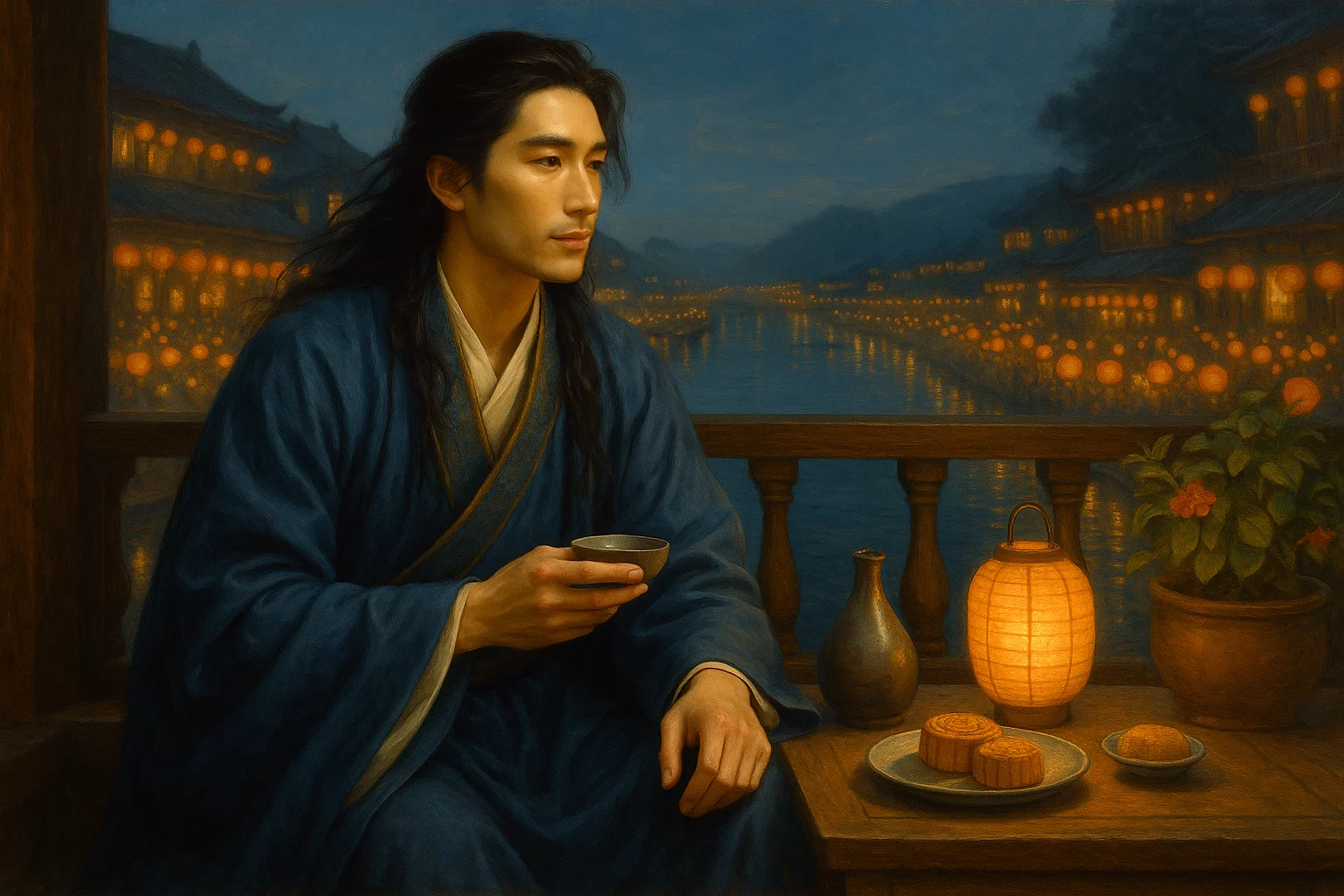
Zhou Bangyan (周邦彦 1056 - 1121), a native of Qiantang (modern Hangzhou, Zhejiang), was the culminating master of the wanyue (graceful and restrained) ci poetry of the Northern Song Dynasty. A virtuoso in musical temperament, his ci are renowned for their opulent refinement and technical perfection. He created dozens of new melodic patterns (cipai) and adhered to strict tonal rules, earning him the title "Crown of Ci Poets." His influence extended to Southern Song masters like Jiang Kui and Wu Wenying, establishing him as the founding patriarch of the Rhymed Ci School.






